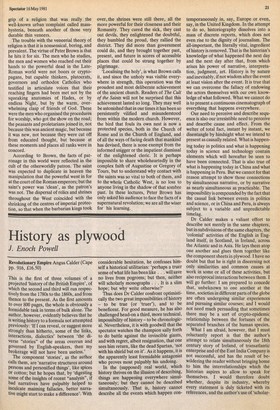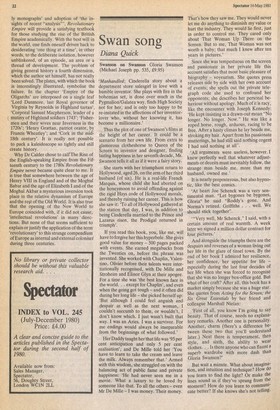History as plywood
J. Enoch Powell
Revolutionary Empire Angus Calder (Cape pp. 916, £16.50) This is the first of three volumes of a projected 'history of the British Empire', of which the second and third will run respectively from the 1780s to the 1860s, and from thence to the present. As the first amounts to over 800 pages, the whole is obviously a formidable task in terms of bulk alone. The author, however, evidently believes that he is writing history to a formula not attempted previously: 'If I can reveal, or suggest more strongly than hitherto, some of the links, interactions, dialectics' between 'the diverse "stories" of the areas overrun and governed by English-speakers, then my brokerage will not have been useless.'
The component 'stories', as the author calls them, are 'narrative structures around persons and personified things', like spices or cotton; but he hopes that, by 'digesting some of the insights of recent "analysis", if bad narratives have palpably helped to inculcate maiming fallacies, better narrative might start to make a difference'. With considerable hesitation, he confesses himself a historical utilitarian: 'perhaps a truer sense of what life has been like . . . will save no lives from pogroms; but then, neither will scholarly monographs . . . It is a slim hope; but why write otherwise?' Thus does Dr Calder confront optimistically the two great impossibilities of history — to be true (or 'true?), and to be• beneficent. For• good measure, he has also challenged head-on a third, more technical, impossibility of history — to be chronological. Nevertheless, it is with goodwill that the spectator watches the champion sally forth to do battle against the invincible giants, and with regret, albeit resignation, that one sees him return, like the dead Spartan, 'not with his shield but on it'. As it happens, it is the apparently least formidable antagonist who proves most palpably his undoing. In the (supposed) real world, which history thrives on the illusion of describing, things are happening everywhere simultaneously; but they cannot be described simultaneously. That is, history cannot describe all the events which happen con temporaneously in, say, Europe or even, say, in the United Kingdom. In the attempt to do so, historiography dissolves into a mass of discrete reports, which does not even rise to the dignity of journalism. The all-important, the literally vital, ingredient of history is removed. That is the historian's knowledge of what happened the next day and the next day after that, from which arises his power of narrative, interpretation, judgment, art. History is by nature and inevitably, if not wisdom after the event at least vision after the event. It is true that we can overcome the fallacy of endowing the actors themselves with our own knowledge of what followed. What we cannot do is to present a continuous cinematograph of everything that happens everywhere.
Our need to perceive and describe sequence is also our irresistible need to perceive and describe cause and effect. From the welter of total fact, instant by instant, we disentangle by hindsight what we intend to present as causally related. What is happen ing today in politics and what is happening today in science and technology contain elements which will hereafter be seen to have been connected. That is also true of what is happening today in China and what is happening in Peru. But we cannot for that reason attempt to show those connections by simultaneous narrative, or by narrative as nearly simultaneous as practicable. The impossibility is compounded by the fact that the causal link between events in politics and science, or in China and Peru, is always subject to a variable and unpredictable timelag.
Dr Calder makes a valiant effort to describe not merely in the same chapters, but in subdivisions of the same chapters, the 'colonial' activities of the English in England itself, in Scotland, in Ireland, across the Atlantic and in Asia. He lays them atop one another and glues them together like the component sheets in plywood. I have no doubt but that he is right in discerning not only similarities and common causes at work in some or all of these activities, but also reciprocal interactions between them. I will go further: I am prepared to concede that, unbeknown to one another at the time, societies in different parts of the globe are often undergoing similar experiences and pursuing similar courses; and I would not need much persuading that sometimes there may be a sort of crypto-epidemic relationship between the fortunes of the separated branches of the human species.
What I am afraid, however, that I must reluctantly report is that the author's attempt to relate simultaneously the 18th century story of Ireland, of transatlantic enterprise and of the East India Company is not successful, and has the result of bewildering the reader without bringing home to him the interrelationships which the historian aspires to allow to speak for themselves. I would therefore doubt whether, despite its industry, whereby every statement is duly ticketed with its references, and the author's use of 'scholar ly monographs' and adoption of 'the insights of recent "analysis"', Revolutionary Empire will provide a satisfying textbook for those studying the rise of the British Empire academically. With the best will in the world, one finds oneself driven back to desiderating `one thing at a time', in other words, to the deliberate isolation, however unblinkered, of an episode, an area or a thread of development. The problem of giving general history a fourth dimension, which the author set himself, has not really been solved. The plates, with which the book is interestingly illustrated, symbolise the failure. In the chapter 'Empire of the Oligarchs' are interposed on a single leaf `Lord Dunmore, last Royal governor of Virginia by Reynolds in Highland tartan', 'Corporal Samuel Macpherson, leader of a mutiny of Highland soldiers 1743'; 'Fishermen and their wives near Inverness in the 1720s'; 'Henry Grattan, patriot orator, by Francis Wheatley'; and `Cork in the mid18th century'. It is really not possible to pack a kaleidoscope so tightly and still create history.
Why Dr Calder chose to calr The Rise of the English-speaking Empire from the Fifteenth century to the 1780s' Revolutionary Empire never became quite clear to me. It is true that somewhere between the age of Henry VIII in England and of the Moghul Babar and the age of Elizabeth I and of the Moghul Akbar a mysterious inversion took place in the relative dynamism of Europe and the rest of the Old World. It is also true that the opening of the New World to Europe coincided with, if it did not cause, 'intellectual revolutions' in many ' direc tions. But none of that seems sufficient to explain or justify the application of the term `revolutionary' to this strange compendium of Europe as internal and external coloniser during three centuries.











































 Previous page
Previous page